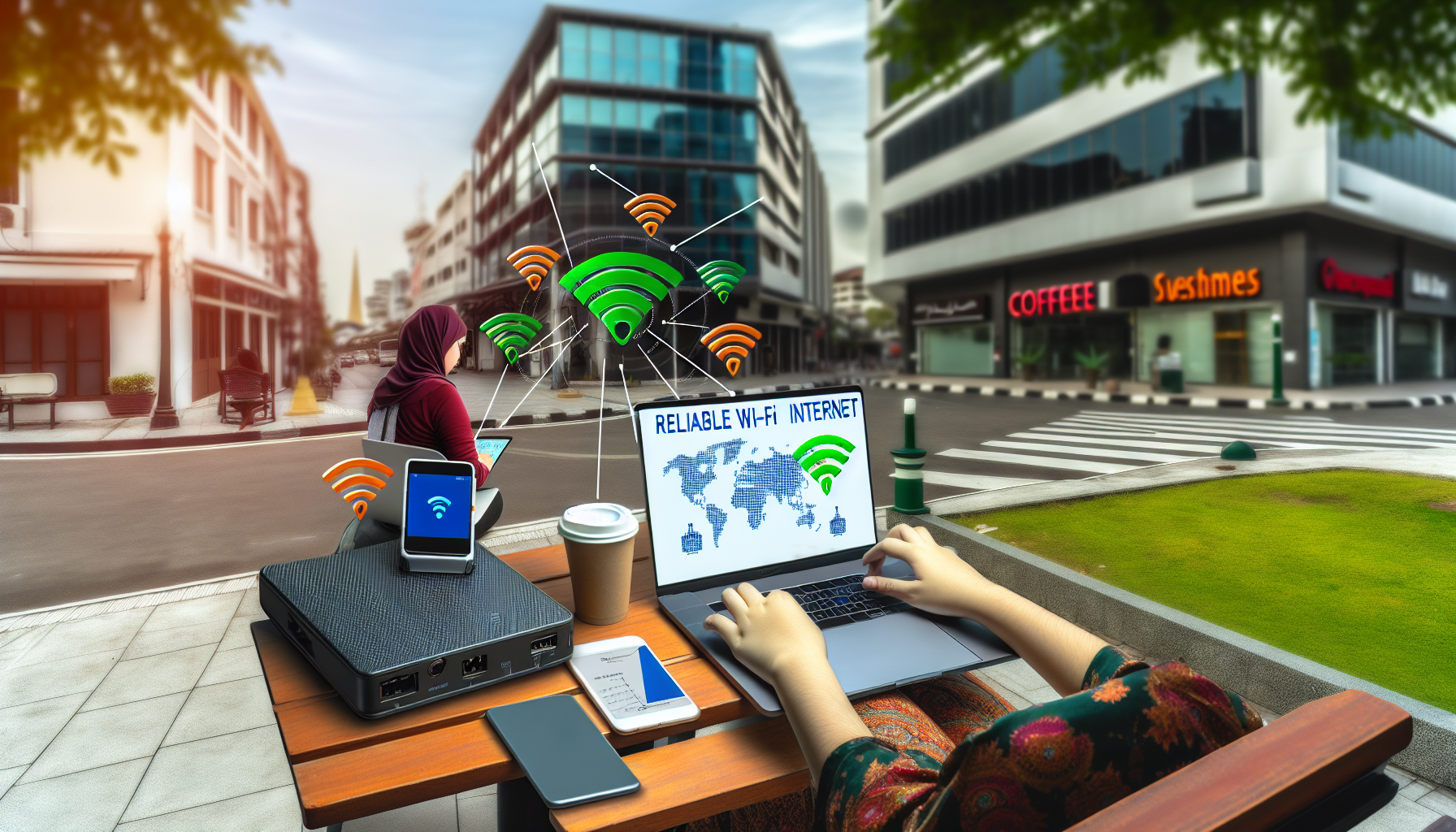Digital nomadism has become an exciting lifestyle that offers the freedom to work from virtually anywhere in the world. However, you can’t be productive without dependable internet access. Let’s dive into some trusted methods to find reliable Wi-Fi and internet while on the move.
Key Takeaways
- Plan and research destinations with solid internet infrastructure
- Utilize co-working spaces and cafés with reputable Wi-Fi
- Invest in portable Wi-Fi devices and international SIM cards
- Join online communities for real-time insights and recommendations
- Consider offline work to ensure productivity without an internet connection
Research Your Destination
Before you pack your bags, research is your best friend. Scan potential destinations for their internet quality, focusing on broadband speed, reliability, and coverage. Websites like Nomad List offer a treasure trove of information. According to digital nomads expert, Caitlin Pyle, “Doing your homework can save you a lot of headaches down the line.”
When planning your next spot, take into account the following key aspects:
- Internet Speed: Countries and cities can vastly differ in broadband speeds.
- Reliability: Look for reviews or forums discussing consistent internet service.
- Cost: Some places might offer great internet speeds, but at a high cost.
Utilize Co-working Spaces and Cafés
Co-working spaces are holy grails for digital nomads. Not only do they provide fast, dependable Wi-Fi, but they also present opportunities for networking and collaboration. Many co-working spaces offer day passes, making them an excellent choice for temporary stays.
When it comes to cafés, look for user reviews or comments on apps like Yelp or Google Maps to ensure the Wi-Fi is reliable. Digital nomad Andrea Whitmer quipped, “A good coffee shop with fast Wi-Fi can feel like hitting the jackpot.”
Co-Working vs. Café Wi-Fi
| Aspect | Co-Working Spaces | Cafés |
|---|---|---|
| Speeds | Usually very high and stable | Variable; can be slower |
| Cost | Often involves a fee | Usually free with purchase |
| Atmosphere | Professional, work-focused | Casual with potential distractions |
| Additional Perks | Networking, amenities | Food and drink varieties |
Invest in Portable Wi-Fi Devices
Portable Wi-Fi devices, also known as MiFi, have gained popularity among digital nomads. These nifty gadgets allow you to create a personal Wi-Fi hotspot using a local SIM card or a global data plan. They’re perfect for staying connected when traditional options fall short.
Top Features to Look for:
- Battery Life: Ensure it can last a full workday.
- Data Speeds: Check compatibility with 4G or 5G networks.
- Coverage: Research which carriers offer the best service in your destination.
Join Online Communities
Becoming part of digital nomad communities like Facebook groups, Reddit’s r/digitalnomad, or local WhatsApp groups can be profoundly beneficial. Members often share insights on the best Wi-Fi spots, troubleshooting tips, and hidden gems.
“I found many great Wi-Fi spots through advice from other digital nomads in online communities,” shares tech blogger John Spencer.
Consider Offline Work
While reliable internet is crucial, it’s wise to have some tasks that don’t require a connection. Carry out writing, planning, or other work that can be done offline. Software like Google Docs offers offline modes, allowing you to synchronize your work once you find a stable connection.
Practical Tips for Staying Connected
- Local SIMs: Purchase local SIM cards with data plans to use with your phone or MiFi.
- Speed Test: Use apps like Speedtest to check Wi-Fi speeds before settling in.
- Backup Options: Have a list of backup Wi-Fi spots (like co-working spaces or other cafés).
- VPN: Use a reputable VPN to secure your data, especially on public networks.
- Frequent Updates: Regularly update your list of best spots as cafés and locations can change.
Staying connected as a digital nomad requires some planning and flexibility. Research, community, and the right tools can make your journey smoother. For more in-depth information, explore websites like Digital Nomad World or join specific groups that cater to remote workers.
Sources:
FAQ
Q1: What if I can’t find a reliable Wi-Fi spot?
A: Consider portable Wi-Fi devices or local SIM cards with data plans. Offline work can also help you stay productive.
Q2: Are co-working spaces worth the investment?
A: Absolutely. They often provide reliable internet, a professional environment, and networking opportunities.
Q3: How do I find trustworthy information about internet speeds in different countries?
A: Websites like Nomad List and online communities provide reliable and updated information based on real user experiences.
